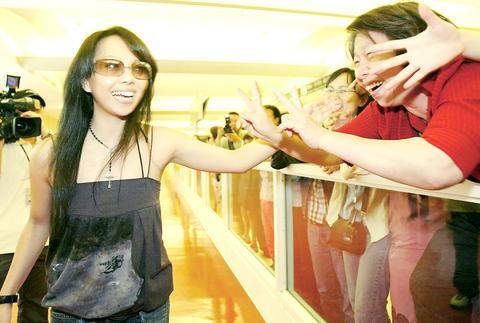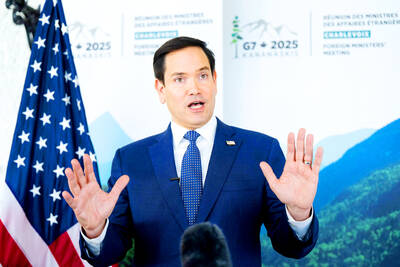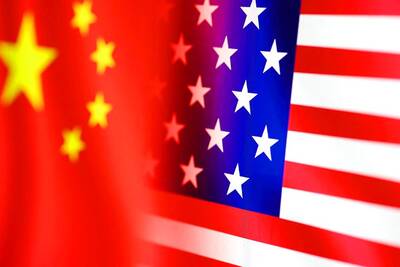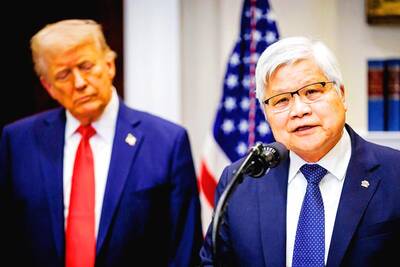Taiwanese pop diva Chang Hui-mei (張惠妹), better known as A-mei, was forced to cancel a performance in China on Saturday night due to a protest by students from Zhejiang University (浙江大學) who accused her of being a supporter of Taiwan independence.
She was scheduled to promote the Master Kong brand of Wei Chuan Food Corp (

PHOTO: TONY YAO, TAIPEI TIMES
At a press conference held by Wei Chuan, Taiwan's second-largest food company, several hundred students raised banners reading "Safeguarding our motherland and unification" (
Faced with student anger, event organizers kept A-mei from the stage.
Days before the event, more than a thousand students from Zhejiang University signed an online boycott of A-mei, expressing discontent with the provincial government for allowing a pro-independence Taiwanese singer to make money in China.
This is not the first time China has blacklisted the Taiwanese singer. Four years ago, A-mei came under a Chinese media blackout for singing the national anthem at President Chen Shui-bian's (
Internet discussions on XinhuaNet and the People's Daily Online show that more Taiwanese entertainers have been blacklisted and become embroiled in political storms.
The users of China's two major Internet sources have identified more than 20 "green performers." They singled out pop singers Jay Chou (
Returning to Taiwan last night, A-mei said she respected the right of Chinese to express themselves on the Internet.
"But I hope the situation will not get complex. We entertainment artists are innocent," she said at CKS International Airport in Taoyuan last night.
A-mei said most Chinese fans were friendly and that she planned to continue with her scheduled activities in China.
Taiwanese businesspeople have faced similar problems across the Strait.
China's criticism of Taiwanese tycoon Hsu Wen-long (
A week after the statement came a diatribe on the front page of the People's Daily calling Chi Mei Optoelectronics (奇美) chairman Hsu, also a presidential adviser, an ardent supporter of independence.
"His Chi Mei Corporation prospered hugely in the mainland, yet he is recognized in Taiwan's business community as a key figure of the Taiwan independence faction," the article said.
Chi Mei Corp has plants in Guangdong and Jiangsu provinces and is eyeing operations in Shanghai.
According to Chen Yi-shen (
Chen said Chinese officials have demanded that all pro-independence businesspeople be excluded as candidates for re-election to the association.

‘CROWN JEWEL’: Washington ‘can delay and deter’ Chinese President Xi Jinping’s plans for Taiwan, but it is ‘a very delicate situation there,’ the secretary of state said US President Donald Trump is opposed to any change to Taiwan’s “status quo” by force or extortion and would maintain that policy, US Secretary of State Marco Rubio told the Hugh Hewitt Show host on Wednesday. The US’ policy is to maintain Taiwan’s “status quo” and to oppose any changes in the situation by force or extortion, Rubio said. Hewitt asked Rubio about the significance of Trump earlier this month speaking with Taiwan Semiconductor Manufacturing Co (台積電) chairman C.C. Wei (魏哲家) at the White House, a meeting that Hewitt described as a “big deal.” Asked whether the meeting was an indication of the

‘RELATIVELY STRONG LANGUAGE’: An expert said the state department has not softened its language on China and was ‘probably a little more Taiwan supportive’ China’s latest drills near Taiwan on Monday were “brazen and irresponsible threats,” a US Department of State spokesperson said on Tuesday, while reiterating Washington’s decades-long support of Taipei. “China cannot credibly claim to be a ‘force for stability in a turbulent world’ while issuing brazen and irresponsible threats toward Taiwan,” the unnamed spokesperson said in an e-mailed response to media queries. Washington’s enduring commitment to Taiwan will continue as it has for 45 years and the US “will continue to support Taiwan in the face of China’s military, economic, informational and diplomatic pressure campaign,” the e-mail said. “Alongside our international partners, we firmly

KAOHSIUNG CEREMONY: The contract chipmaker is planning to build 5 fabs in the southern city to gradually expand its 2-nanometer chip capacity Taiwan Semiconductor Manufacturing Co (TSMC, 台積電), the world’s biggest contract chipmaker, yesterday confirmed that it plans to hold a ceremony on March 31 to unveil a capacity expansion plan for its most advanced 2-nanometer chips in Kaohsiung, demonstrating its commitment to further investment at home. The ceremony is to be hosted by TSMC cochief operating officer Y.P. Chyn (秦永沛). It did not disclose whether Premier Cho Jung-tai (卓榮泰) and high-ranking government officials would attend the ceremony. More details are to be released next week, it said. The chipmaker’s latest move came after its announcement earlier this month of an additional US$100 billion

Authorities yesterday elaborated on the rules governing Employment Gold Cards after a US cardholder was barred from entering Taiwan for six years after working without a permit during a 2023 visit. American YouTuber LeLe Farley was barred after already being approved for an Employment Gold Card, he said in a video published on his channel on Saturday. Farley, who has more than 420,000 subscribers on his YouTube channel, was approved for his Gold Card last month, but was told at a check-in counter at the Los Angeles International Airport that he could not enter Taiwan. That was because he previously participated in two